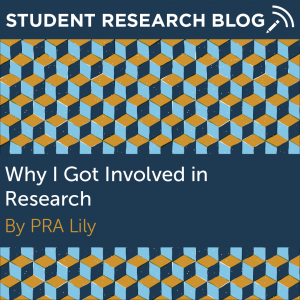By Lily Zhong, Peer Research Ambassador
So you’ve heard UConn is an R1 research institute with boundless opportunities to get involved in undergraduate research, but a few questions start to pile up and overwhelm you: how do I know if research is right for me, how do I know what I’m interested in, what will I be learning, what even is research? If you’re anything like me, these were all questions I asked myself as an eager incoming first-year student with no prior experience in research. While my story may not be, and most likely is not the exact same experience as the next undergraduate researcher, I’m hoping that sharing a bit about my research adventure will shed light on some of the ways research can transform your undergraduate career.
1. Why Research?
Research provides a unique opportunity to shift from being given information and being told correct answers to discovering new knowledge and asking your own questions about the world around you. It’s a chance to dive deeper into your curiosities and explore ways to effectively and reliably design protocols or even entire experiments to search for solutions. In addition, there’s little to no limit to what questions you can ask and the kinds of methods you choose to research those questions. There’s rarely a black and white when it comes to being in a lab; research is the gray in-between that caters towards your interests and pushes you to lean into the uncomfortable yet captivating unknown.
2. Why did I choose to get involved?
For me personally, in addition to the more general reasons listed from question one, I wanted to get involved in research to be able to apply what I was learning from classes to the ‘real world’. I specifically remember that during Biology 1107 with Dr. Abbott in my first year, I found I was having a growing number of questions the more we learned, especially with topics related to studying the brain and its potential dysfunctions. The course’s introduction to these fascinating topics immediately sparked my interest and inspired me to search for a way to learn more. Overall, research provided me with an avenue to study what I found most intriguing in my classes in much greater depth.
3. What were my research goals and interests?
My research goals were to pursue my interests related to the biological basis behind stress and anxiety. By further analyzing the anatomy and physiology behind these behaviors, I hoped to begin elucidating neuronal mechanisms that may contribute to stress and anxiety, which could potentially contribute to future therapeutic strategies for human anxiety disorders.
4. What have I learned from engaging in research?
By engaging in research, I have not only learned numerous lab techniques and built a strong foundation of background literature, but I also improved upon crucial skills of resilience, dedication, and critical thinking. With frequent drawbacks, I was often challenged to search through existing research and collaborate with other lab members to trial alternate techniques or develop new solutions. In addition, I learned to effectively communicate these complex scientific topics and explain the work’s significance to a broader audience through poster presentations or grant proposals. Overall, through my experiences in Dr. Jackson’s Lab, I am learning to become a more competent and independent student researcher, growing upon transferable skills that will apply to numerous future endeavors.
Lily is a senior majoring in Physiology & Neurobiology and minoring in English. Click here to learn more about Lily.